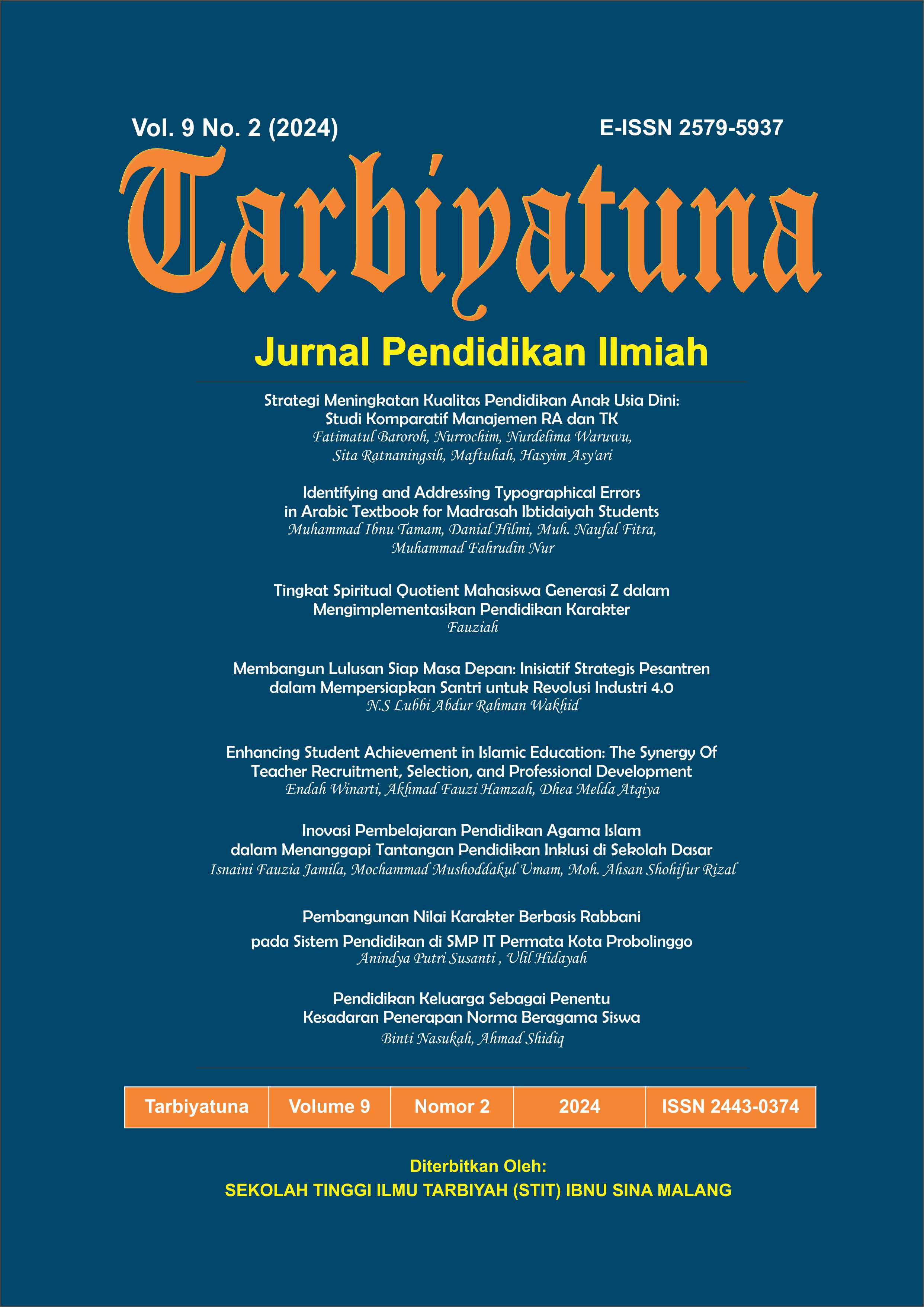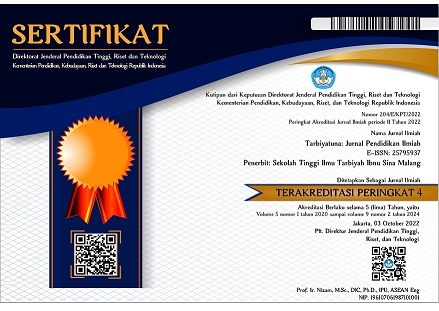Pendidikan Keluarga sebagai Penentu Kesadaran Penerapan Norma Beragama Siswa
Abstract
This study examines the role of family education as a determinant of students' awareness in applying religious norms. The research is grounded in previous studies that highlight the significant influence of teacher-led education on students' adherence to religious norms. However, challenges persist in Islamic-based schools, such as SMP Muhammadiyah 5 Pagak, Malang Regency, where some students exhibit low awareness in practicing religious norms despite the school's strong emphasis on religious values. This study aims to confirm whether inadequate family education contributes to these challenges. The research employs a quantitative method with a survey approach. Primary data were collected through questionnaires, while secondary data were gathered through observations and interviews. The findings reveal a positive and significant influence of family education on students' application of religious norms, accounting for 44.9% of the variance. This indicates that higher levels of family education are associated with better adherence to religious norms among students. The study concludes that family education plays a crucial role in shaping students' awareness and application of religious norms. For Islamic educational institutions, addressing students' low awareness in applying religious norms may require collaboration with families to enhance the quality of family education.
References
Abdullah, M. I. (2003). Pendidikan Keluarga Bagi Anak. Cirebon: Lektur.
Adinsyah, S. N. (2022). Pengertian dan Konsep Penyimpangan Sosial. Cv Media Edukasi Creative.
al-Bukhari, A. A. M. bin I. (1980). Al Jami’ al Shahih (Shahih Bukhari). Beirut: Dar al-Fikr.
Amaruddin, H., Atmaja, H. T., & Khafid, M. (2020). Peran Keluarga dan Media Sosial dalam Pembentukan Karakter Santun Siswa di Sekolah Dasar. Jurnal Pendidikan Karakter, 11(1), 33-48. https://doi.org/10.21831/jpk.v10i1.30588
Arikunto, S. (2006). Prosedur Penelitian Suatu Pendekatan Praktik. Rineka Cipta.
Damanik, M. T. R., Tarigan, M. R. M., Qothrunnada, A., Sukana, D. S., & Siahaan, N. A. S. (2024). Pergaulan Bebas Generasi Muda dalam Perspektif Al-Qur’an. Al-Muhajirin: Jurnal Pendidikan Islam, 1(1).
Djollong, A. F., & Akbar, A. (2019). Peran Guru Pendidikan Agama Islam dalam Penanaman Nilai-Nilai Toleransi antar Ummat Beragama Peserta Didik untuk Mewujudkan Kerukunan. Jurnal Al-Ibrah, 8(1), 72-92.
Ghozali, I. (2018). Aplikasi Analisis Multivariate dengan Program SPSS. Semarang: Universitas Diponogoro.
Hairullah. (2023). The Important of the Family Roles in Building the Children’s Character. Influence: International Journal Of Science Review, 5(1), 100-106. https://doi.org/10.54783/influencejournal.v5i1.107
Husain, R. R., & Takdir, F. (2019). Keluarga Sebagai Madrasah Pertama dan Media Optimalisasi Fungsi Edukatif. Foramadiahi: Jurnal Kajian Pendidikan Dan Keislaman, 10(1), 68–81. https://doi.org/10.46339/foramadiahi.v10i1.113
Kementrian Agama RI. (2006). Al-Qur’an Tajwid dan Terjemahannya. Bandung : CV Penerbit Diponegoro.
Maimunah, A., Sari, D. M., Choliq, A. N., Sukatin, S., & Yusup, M. (2022). Shaping Children’s Character Through Religious and Family Education. AURELIA: Jurnal Penelitian Dan Pengabdian Masyarakat Indonesia, 1(2), 224-229. https://doi.org/10.57235/aurelia.v1i2.155
Mansur. (2005). Pendidikan Usia Dini. Yogyakarta: Pustaka Pelajar.
Mubarok, G. A., & Muslihah, E. (2022). Peran Guru Pendidikan Agama Islam Membentuk Sikap Keberagaman dan Moderasi Beragama. Geneologi PAI: Jurnal Pendidikan Agama Islam, 9(1), 115-130. https://doi.org/10.32678/geneologipai.v9i1.6616
Nurjaman, A. R. (2020). Pendidikan Agama Islam. Bumi Aksara.
Pristiwanti, D., Badariah, B., Hidayat, S., & Dewi, R. S. (2022). Pengertian Pendidikan. Jurnal Pendidikan Dan Konseling (JPDK), 4(6), 7911–7915. https://doi.org/10.31004/jpdk.v4i6.9498
Rahmayanty, D., Khasanah, U. L., Emosda, R. H., Rinjani, A. P., & Anggraini, D. (2024). Peran Keluarga, Sekolah, dan Masyarakat Dalam Pembentukan Karakter Berkualitas. CONS-IEDU, 4(2), 320-328. https://doi.org/10.51192/cons.v4i2.889
Razak, A. A., Jannah, F., & Saleh, K. (2019). Pengaruh Pembelajaran Pendidikan Agama Islam Terhadap Perilaku Siswa di SMK Kesehatan Samarinda. El Buhuth: Borneo Journal of Islamic Studies. https://doi.org/10.21093/el-buhuth.v1i2.1582
Romanto, R., Irawan, M. F., & Zakaria, A. R. (2024). The Importance of Parental Teaching in Shaping Children’s Islamic Character: Parents’ Perceptions. Al Ulya: Jurnal Pendidikan Islam, 9(2), 181-192. https://doi.org/10.32665/alulya.v9i2.3257
Sardipan, A. A., Hente, M. A., & Ayuningtias, F. (2021). Peranan Orang Tua dalam Upaya Mengatasi Kenakalan Remaja di Kelurahan Poboya Kecamatan Mantikulore Kota Palu: Jurnal Kolaboratif Sains, 4(4), 211-215. https://doi.org/10.56338/jks.v4i4.1830
Sugiyono. (2012). Metode penelitian pendidikan pendekatan kuantitatif, Kualitatif, dan R&D. Alfabeta.
Tarmizi, T., Mitrohardjono, M., Ramadhan, A. I., Maryati, Fajri, A., & Faizuddin, A. (2023). The Roles of Family Strenghthening Children’s Religious Characters. Journal of Humanity and Social Justice, 110–123. https://doi.org/10.38026/jhsj.v5i2.21
Widaningsih, S., & Putri, F. A. (2023). Efforts to Form True Muslim Character Based on Family Education. Cendekiawan : Jurnal Pendidikan Dan Studi Keislaman, 2(3), 327-333. https://doi.org/10.61253/cendekiawan.v2i3.218
Yasin, A. F. (2008). Dimensi-Dimensi Pendidikan Islam. Malang: UIN-Malang Press.








.png)

